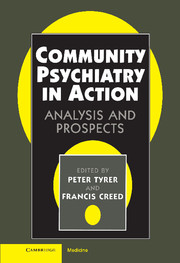Book contents
- Frontmatter
- Contents
- List of contributors
- 1 Essential issues in community psychiatry
- 2 Evaluation of community treatments for acute psychiatric illness
- 3 Synopsis of the Daily Living Programme for the seriously mentally ill: a controlled comparison of home and hospital based care
- 4 Evaluation of a complete community service
- 5 Early intervention study of psychiatric emergencies
- 6 Evaluation of psychiatric services: the merits of regular review
- 7 A home based assessment study
- 8 Home treatment as an alternative to acute psychiatric inpatient admission: a discussion
- 9 The toxicity of community care
- 10 Community mental health services: towards an understanding of cost-effectiveness
- 11 Future research strategies
- Index
2 - Evaluation of community treatments for acute psychiatric illness
Published online by Cambridge University Press: 06 July 2010
- Frontmatter
- Contents
- List of contributors
- 1 Essential issues in community psychiatry
- 2 Evaluation of community treatments for acute psychiatric illness
- 3 Synopsis of the Daily Living Programme for the seriously mentally ill: a controlled comparison of home and hospital based care
- 4 Evaluation of a complete community service
- 5 Early intervention study of psychiatric emergencies
- 6 Evaluation of psychiatric services: the merits of regular review
- 7 A home based assessment study
- 8 Home treatment as an alternative to acute psychiatric inpatient admission: a discussion
- 9 The toxicity of community care
- 10 Community mental health services: towards an understanding of cost-effectiveness
- 11 Future research strategies
- Index
Summary
Overview of UK studies
Introduction
The growth of community treatment programmes for acute psychiatric illness has provoked considerable discussion in relation to both service development and research. On the one hand, the ‘enthusiasts’ for community treatments argue that this is the superior form of care and imply that every district should switch their resources from hospital to community treatment. On the other hand, critics argue that the superiority of community treatment has yet to be firmly established, either pointing out weaknesses in the research or insisting that any beneficial effects are probably marginal, related to the enthusiasm of the staff involved and that the real costs (e.g. possible increased suicide rate or ‘burn-out’ of staff) have yet to come to light. The argument tends to highlight the missionary zeal of the community enthusiasts and the defensiveness of the traditionalists rather than being based on sound scientific principles. The research findings to date are not sufficiently persuasive to end the argument.
The studies most widely quoted in favour of the community approach are those of Stein & Test (1980) and Hoult (1986); as these are outside the UK they can be criticised or supported with a degree of detachment. This is not so for the recent UK studies; the results of these local studies need to be examined firstly, to inform decisions about how UK community psychiatric services might be developed (including how they may contribute to ‘Health of the Nation’ targets) and secondly, to establish the next generation of research questions (Rosen, 1992; NIMH, 1991).
- Type
- Chapter
- Information
- Community Psychiatry in ActionAnalysis and Prospects, pp. 11 - 28Publisher: Cambridge University PressPrint publication year: 1995
- 2
- Cited by



